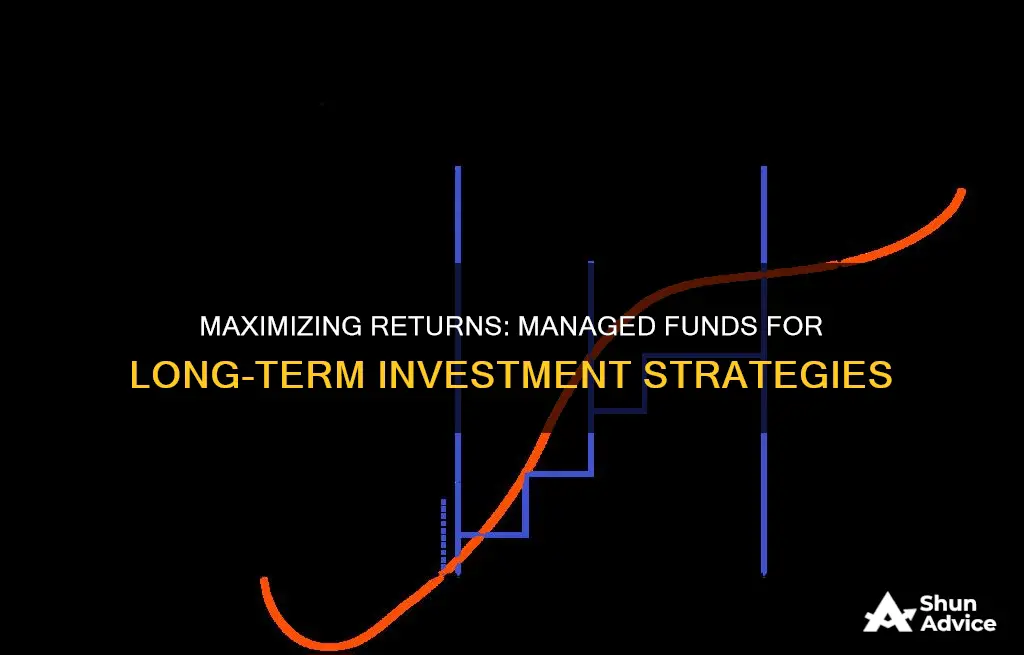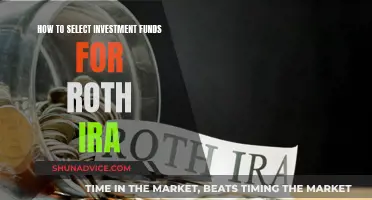
A managed fund is a type of investment where your money is pooled with other investors and managed by professionals. It's an attractive option for investors as it offers diversification, professional management, and access to a wide range of investments. However, it's important to understand the different types of funds, the associated fees, and the risks involved before deciding when to invest in a managed fund.
| Characteristics | Values |
|---|---|
| Type of Investment | Pooled money from investors |
| Investment Management | Managed by professionals |
| Investment Diversification | Diversified across countries, asset classes, industries and companies |
| Investment Access | Access to a broad range of investments |
| Investment Expertise | Experienced and qualified fund managers |
| Regular Contributions | Opportunity to make regular contributions |
| Compounding Effect | Reinvesting income earned compounds investment |
| Investment Amount | Requires a minimum amount to invest |
| Investment Risk | All investments carry a degree of risk |
| Investment Returns | Returns based on fund performance minus fees or expenses |
| Investment Liquidity | Highly liquid investments |
| Investment Research | Research and compare funds before investing |
| Investment Fees | Annual fees, expense ratios, or commissions |
What You'll Learn

Understand the different types of funds, their risks and returns
Understanding the different types of funds, their risks, and returns is essential when considering investing in a managed fund. Managed funds are a type of investment where money from multiple investors is pooled together and managed by professionals, who then invest in various assets such as shares, property, bonds, or cash. There are two main types of fund management: active and passive. Active management aims to outperform the market by actively choosing and trading investments, while passive management, such as index funds, aims to replicate the performance of a market index.
When it comes to risks and returns, it's important to note that all investments carry some level of risk. The risk associated with managed funds depends on the specific assets they invest in. For example, equity or stock funds tend to experience price fluctuations, while fixed-income or bond funds focus on investments that provide a consistent and minimum return. Actively managed funds may offer the potential for higher returns but also carry higher risks. On the other hand, passively managed index funds aim for lower costs and often outperform actively managed funds.
Additionally, fees play a significant role in determining the overall returns of a managed fund. Managed funds charge various fees, including annual fees, expense ratios, and commissions, which can vary widely among different funds. These fees directly impact the returns that investors receive, so it's crucial to carefully review and understand the fee structure before investing.
When considering different types of funds, it's important to assess your risk tolerance and investment goals. Defensive, conservative, and balanced funds tend to be less risky, while growth and aggressive funds usually carry higher risk levels. However, it's worth noting that higher risk does not always guarantee higher rewards. Therefore, it's essential to carefully review the fund's documentation, such as the product disclosure statement (PDS), to understand the risks, returns, fees, and investment strategy before making any investment decisions.
Retirement Fund Investment: Choosing the Right Option
You may want to see also

Compare managed funds with other investment options
Managed funds are a type of investment where your money is pooled with other investors and a fund manager buys and sells assets on your behalf. You own 'units' in the fund or 'shares' in the Corporate Collective Investment Vehicle (CCIV). The value of these units or shares fluctuates with the value of the underlying assets.
Managed funds can be further categorised into single-asset funds, fixed-interest or bond funds, share (equity) funds, alternative investment funds, and mixed-asset or multi-sector funds.
Managed Funds vs Mutual Funds
Mutual funds are a type of managed account, but they are open to anyone who can buy shares, rather than being tailored to a particular investor. Mutual funds are classified by investors' risk tolerance and the fund's investment objectives, whereas managed accounts are personalised investment portfolios customised to the specific risks, goals, and needs of the account holder.
Mutual funds are more liquid than managed accounts, as their shares can be bought and sold daily. Managed accounts may take days to invest or divest assets. Mutual fund shareholders also have no control over when portfolio managers sell underlying securities, so they may face tax bites on capital gains. Conversely, managed account managers can attempt to offset gains and losses by buying and selling assets when it is most tax beneficial to the account owner, potentially resulting in little to no tax liability on a significant profit.
Managed Funds vs Index Funds
Index funds are designed to keep pace with market returns by trying to mirror certain market segments. They buy all or a representative sample of the stocks or bonds in the index they are tracking. Actively managed funds, on the other hand, try to beat market returns with investments hand-picked by professional money managers.
Index funds tend to have lower fees than actively managed funds. Vanguard, the indexing leader, attracted $19.7 billion in inflows in 2018 and $6.9 billion in January 2019. However, there are sectors, industries, and fund managers that claim to beat the indexes. After a 10-year bull market, with increased chances of losses in market indices, it might be time to seek out actively managed funds.
Best Vanguard Funds to Maximize Your 401(k) Returns
You may want to see also

Weigh up the pros and cons of managed funds
Managed funds, also known as mutual funds, are a modern way of achieving your investment goals. They are a type of investment where your money is pooled with other investors and a fund manager buys and sells assets on your behalf.
Pros of Managed Funds
Managed funds offer a convenient and time-effective way of investing. They take the hard work out of selecting which assets to invest in and monitoring their performance. By investing in a managed fund, you gain access to a team of investment professionals with a wealth of experience, knowledge, and exposure to the latest information.
One of the key advantages of managed funds is diversification. They allow you to invest in a wide range of assets, including shares, property, bonds, and cash, across different countries, industries, and companies. This diversification can reduce the impact of fluctuations in an investment's market value.
Additionally, managed funds provide access to investments that may otherwise be out of reach for individual investors. By pooling money together, managed funds can invest in assets such as property, mortgage-backed securities, or corporate or government bonds.
Managed funds also offer a regular savings plan, allowing you to make regular contributions to your investment. This can result in "dollar-cost averaging," where you end up paying less per unit over time.
Cons of Managed Funds
One of the main drawbacks of managed funds is the fees involved. These typically include entry, exit, and ongoing management fees, which can eat into your overall returns. The level of fees varies greatly among funds, and it's important to carefully review the fee structure before investing.
Another disadvantage is the dilution of control over your asset selection. When investing in a managed fund, you are investing in the shares or assets chosen by the fund manager, not yourself.
Additionally, managed funds are subject to the risk of losses, just like any other investment. In the event of significant devaluation of its underlying assets or issues with the fund manager's integrity, a "run" may occur, where multiple investors try to cash out their units simultaneously. This could lead to a fire sale of assets or the fund trustee temporarily freezing redemptions to protect the fund's assets.
Managed funds offer a convenient and diversified investment option, particularly for those who don't have the time or expertise to manage their investments independently. However, it's essential to carefully consider the fees, understand the level of control you have over your investments, and be aware of the potential risks involved.
Hedge Funds vs Investment Banks: Understanding the Key Differences
You may want to see also

Know the fees involved
When investing in a managed fund, it's important to be aware of the fees involved, as these will impact your overall returns. Here are some common fees associated with managed funds:
Establishment Fee
This is the cost to open your investment account and typically ranges from 0% to 5% of the amount you invest.
Contribution Fee
The fee charged on each contribution made to your investment account, usually between 0% and 5%.
Management Fees and Costs
Annual fees deducted from your account balance to cover the cost of managing your investment, typically ranging from 0.5% to 2.5%.
Performance Fee
Some fund managers may charge an additional fee if the investment return exceeds the benchmark or target return.
Adviser Service Fee
An ongoing fee paid to your financial adviser for arranging the investment, typically ranging from 1% to 2% per year.
Transaction and Withdrawal Fees
There may be fees for specific transactions, such as withdrawals, changing investment options, or exiting the scheme.
It's worth noting that some fund managers may be open to negotiating these fees. Additionally, fees can have a significant impact on your returns, so it's important to carefully review and understand the fee structure before investing.
When comparing managed funds, you can use resources like the Fund Screener on the Morningstar website to search for funds based on fees and other criteria. It's also essential to read the Product Disclosure Statement (PDS) provided by the fund, as this document will outline all the relevant fees and charges.
Key Factors for Choosing the Right Mutual Fund Investments
You may want to see also

Research the fund's past performance
Researching a fund's past performance is a crucial step in deciding whether to invest in a managed fund. While past performance is not a reliable indicator of future returns, reviewing how a fund has fared over time can provide valuable insights into its ability to weather market volatility. Here are some key considerations when evaluating a managed fund's track record:
- Long-term Perspective: Assess the fund's returns over an extended period, preferably ten years or more. A fund that has consistently generated positive returns over a more extended period demonstrates its ability to navigate different market conditions.
- Comparative Analysis: Compare the fund's performance against relevant benchmarks or market indices. This allows you to determine if the fund is keeping pace with the overall market or its peers. Tools like the Morningstar website's Fund Screener can help in this regard.
- Risk-adjusted Returns: Consider the fund's risk-adjusted returns, which take into account the level of risk taken to generate those returns. A fund with higher returns but significantly higher risk may not be as attractive as a fund with slightly lower returns but a more conservative approach.
- Performance Consistency: Look for consistency in the fund's performance over time. A fund that consistently outperforms or meets its benchmarks indicates a robust investment strategy and capable fund management.
- Market Cycles: Evaluate the fund's performance during different market cycles, such as bull and bear markets. This analysis can provide insights into how the fund adapts to changing market conditions and its ability to protect investors' capital during downturns.
- Style Adherence: Ensure that the fund's past performance aligns with its stated investment style or strategy. If a fund advertises itself as a growth fund, review if it has indeed achieved capital appreciation over time.
- Manager Track Record: Consider the track record of the fund manager or management team. A stable and experienced management team with a history of strong returns can be a positive indicator.
- Performance Persistence: While past performance doesn't guarantee future results, some studies suggest that funds with a history of outperformance may be more likely to continue their winning streak. However, this is not always the case, and other factors should also be considered.
Remember, reviewing a fund's past performance is just one aspect of your due diligence. It should be combined with a comprehensive analysis of the fund's fees, investment strategy, risk profile, and other factors to make a well-informed investment decision.
Nas' Venture Capital: Where Does He Invest?
You may want to see also







